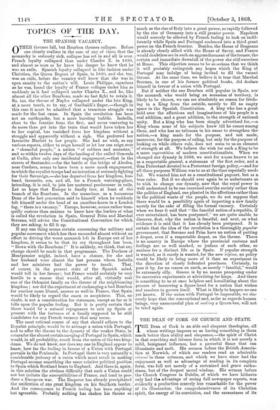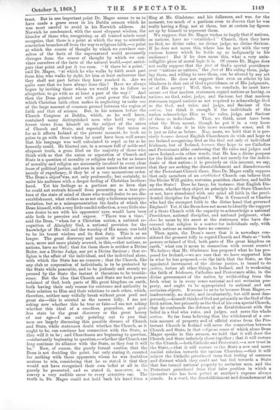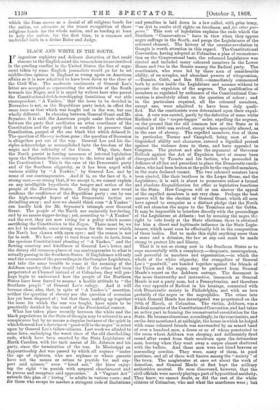THE DEAN OF CORK ON CHURCH AND STATE.
trust. But in one important point Dr. Magee seems to us to have made a grave error in his Dublin sermon which he was most careful to avoid in his Norwich address. At, Norwich he condemned, with the most eloquent wisdom, the blunder of those who, recognizing, as all trained minds must recognize, that there is a point at which the way to scientific conviction branches off from the way to religious faith,—a point .at which the course of thought by which we convince our- selves of the facts of the supernatural world necessarily diverges from the course of thought by which we con- vince ourselves of the facts of the natural world,—yet antici- pate that point and put it too soon. " If there be a point," said Dr. Magee, "at which he who walks by faith must part from him who walks by sight, let him at least endeavour that they shall not part before they have reached it. Are we quite sure that we have always done this ? Have we always begun by inviting those whom we would win to follow us altogether, to go with us at least a part of the way ?" And then the Dean pointed out with great power the blunder which Christian faith often makes in neglecting to make use of the large amount of common ground between the region of faith and that of science. But, in his sermon before the Church Congress at Dublin, which, as he well knew, contained many distinguished men who hold very dif- ferent views from himself on the subject of the union of Church and State, and especially on that union so far as it affects Ireland at the present moment, he took no pains to go with those whom he must have been well aware that his language was well calculated to repel as far as he honestly could. He blurted out, in a sermon full of noble and eloquent truth, a gross libel on the majority of those who think with us that the union or separation of Church and State is a question of morality or religion only so far as issues of morality and religion are necessarily involved in every clear issue of political justice, and even in most issues that are issues merely of expediency, if they be of a very momentous order. The Dean's object was, not only professedly, but certainly, to unite his audience with a deeper feeling of Christian brother- hood. Yet his feelings as a partizan are so keen that he could not restrain himself from presenting as a true pic- ture of the state of mind of those who would desire to see dis- establishment, what strikes us as not only a ludicrous misrepre- sentation, but as a misrepresentation the faults of which the Dean himself, with a very little candid reflection, a very little sin- cere desire to see with his opponents' eyes, would have been able both to perceive and expose. " There was a time," said the Dean, " when for a Christian nation, a national re- cognition of Almighty God, a national provision for the knowledge of His will and the worship of His name, was held to be its truest wisdom and its first duty. This is so no longer. The great discovery and maxim of modern states- men, more and more plainly avowed, is this,—that nations, as nations, have no God ; that for them there is neither a Divine Ruler, nor a Divine Judge, nor yet a Divine Saviour ; that re- ligion is the affair of the individual, and the individual alone, with which the State has no concern ; that the Church, like any club or corporation of individuals, is to be protected by the State while peaceable, and to be jealously and sternly re- pressed by the State the instant it threatens to be trouble- some. But the idea that Church and State are both powers ordained of God, both parts of His great kingdom on earth, both having their only reason for existence and authority in their relation to Him and their relations to each other, which, therefore, neither may wilfully break without great peril and great sin—this is scouted as the merest folly. I am not asking now whether this be true or false—I am not asking whether this ideal of a creedless, prayerless, and god- less state be the great discovery or the great heresy of our age—I am only pointing out to you that men are largely discussing this possible divorce of Church and State, while statesmen doubt whether the Church, as it ought to be, can continue her connection with the State, as they will it to be ; and Churchmen are beginning to question, —reluctantly beginning to question,—whether the Church can long continue its alliance with the State, as they fear it will be." Now, of course, the purely formal caution that the Dean is not deciding the point, but only stating it, counted for nothing with those opponents whom he was doubtless anxious to win, considering that he so stated it that they would not have recognized their own belief at all in the parody he presented, and so stated it, moreover, as to convey a very audible sneer to every attentive ear. The truth is, Dr. Magee could not hold back his hand from a fling at Mr. Gladstone and his followers, and was, for the moment, too much of a partizan even to discern that he was really having a fling, not at them, but at certain lay figures set up by himself to represent them.
We suppose, that Dr. Magee wishes to imply that if nations, as nations, have no " established " Church, then they have no God, no divine ruler, no divine judge, no divine Saviour. If he does not mean this, where has he met with the very curious heresy which he holds up so indignantly to his audience ? But if he does mean this, what a very unin- telligible piece of moral logic it is. Of course Dr. Magee does not really suppose that the fret of God's special providence over "nations as nations," the filet of His ruling them, judg- ing them, and willing to save them, can be altered by any act of theirs. He does not suppose that even an atheist by his blindness is shut out of God's providence, or of His judgments, or of His mercy ? Well, then, we conclude, he must have meant not that modern statesmen regard nations as having, as nations, no God, ruler, judge, and Saviour, but that modern statesmen regard nations as not required to acknowledge God as the God, and ruler, and judge, and Saviour of the nation, but think it enough if the individuals of the nation acknowledge Him as the ruler, judge, and Saviour of them as individuals. That, we think, must have been what the Dean meant, though he put it in a very loose form. But take it in this more reasonable sense, and it is just as false as before. Nay, more, we hold that it is pre- cisely because devout English Churchmen do wish and hope to see Ireland recognizing God as the God not only of individual Irishmen, but of Ireland, because they hope to see Catholics and Protestants alike confessing that He rules and judges and saves Ireland,—in other words, that He has a divine purpose for the Irish nation as a nation, and not merely for the indivi- duals of that nation ; it is precisely on this account, we say, that they are seeking the disestablishment and disendowment of the Protestant Church there. Does Dr. Magee really suppose that only members of an established Church can believe that the Divine Will guides, restrains, punishes, chastises, and builds up the State ? Does he fancy, for instance, that English Dis- senters, whether they object on principle to all State Churches or not, have abandoned with one mind all faith in the provi- dential discipline for England ? Was it Cromwell or Charles who had the strongest faith in the divine hand that governed England? Yet, if the Dean does not mean to identify the support of a State Church with the capacity to acknowledge a national Providence, national discipline, and national judgment, what does he mean by his sneer at the statesmen who have dis- covered that religion is a matter for individuals only, with which nations as nations have no concern ?
Then, again, the Dean's sneer that it is nowadays con- sidered the grossest folly to regard Church and State as " both powers ordained of God, both parts of His great kingdom on earth," what can it mean in connection with recent events We believe that Mr. Gladstone has proposed what he has pro- posed for Ireland,—we are sure that we have supported him in what he has proposed,—in the faith that the State, as the appointed instrument of the divine justice, is bound to do justice, before all other things, to Ireland, and is weakening the faith of Irishmen, Catholics and Protestants alike, in the divine government of the nation by withholding from the Irish what is in every sense national and not sectarian pro- perty, and ought to be appropriated to national and not sectarian objects. It seems to us to be because Dean Magee,— inadvertently, no doubt, and involuntarily, but still most dan- gerously,—himself thinks of God not primarily as the God of the Irish nation, but primarily as the God of his own special Church, that he confounds the defence of an Establishment with the belief in a God who rules, and judges, and saves the whole nation. So far from believing that the withdrawal of a cer- tain amount of property and of official status from the Pro- testant Church in Ireland will sever the connection between Church and State, in that religious sense of which alone Dean Magee speaks in this sermon, we hold that it will draw the Church and State infinitely closer together ; that it will restore to the Church,—both Catholic and Protestant,—a new trust in the State,—that it will restore to the State a new and more cordial relation towards the various Churches,—that it will relieve the Catholic priesthood from that feeling of soreness and distrust which they could not but feel towards a State that has turned national property to sectarian uses, and the Protestant priesthood from that false position in which a favourite who has been petted at another's expense always stands. In a word, the disestablishment and disendowment at, which the Dean sneers as a denial of all religious bonds for the nation, we advocate as the truest recognition of those religious bonds for the whole nation, and as tending at least to help the nation, for the first time, to a common and undivided faith in a divine Ruler and Judge.
































 Previous page
Previous page